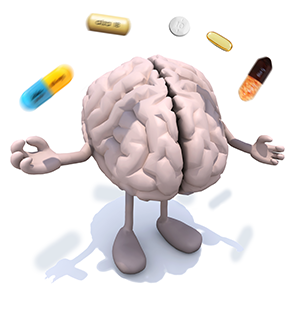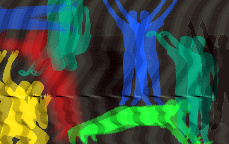From a medical perspective, Attention Deficit Hyperactivity Disorder (ADHD) is a neurobiological condition that has historically been associated mainly with children. However, the condition can also present itself in adults and since 2008 Adult ADHD has been a recognised diagnosis. It is likely that it was present in childhood but was overlooked. Approximately 60% of children with ADHD will continue to have significant ADHD-related difficulties in adulthood. This can have an impact on education, employment and their interpersonal relationships.
Someone diagnosed with ADHD will have difficulties with self-regulation and self-motivation. They will be easily distracted and procrastinate and have problems with organisation and prioritisation. Intellectual ability IS NOT affected by ADHD. People with the diagnosis have the same potential as other adults and in many cases are gifted in certain areas and have a high or above average IQ. ADHD is a life-long condition with its roots in early childhood and persisting throughout a person’s lifetime.
One of the earliest recorded references to ADHD being a behavioural issue was by Heinrich Hoffman in his Struwwelpeter books, specifically with the stories of Fidgety Phil (Hyperactive), Flying Robert (Stimulus seeking) and Johnny Head in air (Day dreaming).




ADHD can present it self in three different presentations:
- Inattentive
- Hyperactive/Impulsive – Combined Inattentive
- Hyperactive and Impulsive
MANAGING ADHD POSITIVELY
UKAAN (UK Adult ADHD Network) describe the following:
 There are various ways of dealing with the difficulties, the one that is commonly, yet controversially associated with ADHD is with stimulant medication, specifically methylphenidate, the most familiar or infamous being the brand name for the medication Ritalin. Others include atomoxetine and dexamphetamine. These pharmaceutical interventions would only be available through a prescription from a medical practitioner, ideally a qualified Clinical Psychologist or Psychiatrist. Your GP can prescribe them only on the advice of an ADHD professional who understand the medication, specifically as the medications are psychoactive and are controlled drugs under the UK Misuse of Drugs Act 1971.
There are various ways of dealing with the difficulties, the one that is commonly, yet controversially associated with ADHD is with stimulant medication, specifically methylphenidate, the most familiar or infamous being the brand name for the medication Ritalin. Others include atomoxetine and dexamphetamine. These pharmaceutical interventions would only be available through a prescription from a medical practitioner, ideally a qualified Clinical Psychologist or Psychiatrist. Your GP can prescribe them only on the advice of an ADHD professional who understand the medication, specifically as the medications are psychoactive and are controlled drugs under the UK Misuse of Drugs Act 1971.
However pharmaceuticals are not the only thing, Cognitive Behavioural Therapy (CBT) has been shown to have a positive affect on the mood aspect of ADHD when combined with medication. ADHD Coaching is similar to CBT in that strategies are devised to recognize and deal with ADHD mood swings and behaviours that cause difficulties, time management and associated problems with organization and procrastination. Other alternatives include meditation practices such as Mindfulness and dietary supplements. NeuroKnowHow has been involved in recent research with Omega oil supplements. Which method chosen depends on the individual diagnosed as ADHD, their needs and what suits them.
Due to ADHD often being misunderstood, many people do not receive appropriate treatment and, as a result, may never reach their full potential. Part of the problem is that it can be difficult to diagnose, particularly in adults. Some also choose to do nothing, believing that the treatments will make them become someone they are not or take away the beneficial aspects, especially the creativity, of ADHD. One symptom of ADHD is a tendency to become ‘Oppositional’ and this may also interfere with any strategy suggested unless the individual really wants or needs to manage their condition. Rather than reduce creativity, treatments may make it more possible for the creativity to be used or channeled more effectively for the benefit of the person, especially in a work situation.
Hyperactivity

- Feelings of inner restlessness, agitation
- Tendency to take risks
- Getting bored easily
- Racing thoughts
- Trouble sitting still; constant fidgeting
- Craving for excitement
- Talking excessively
- Doing a million things at once
Impulsivity

- Frequently interrupt others or talk over them
- Have poor self-control
- Blurt out thoughts that are rude or inappropriate without thinking
- Have addictive tendencies
- Act recklessly or spontaneously without regard for consequences
- Have trouble behaving in socially appropriate ways (such as sitting still during a long meeting)
- Tends to act with out thinking
- Difficult to resist temptations opportunities
- Is often impatient
- Uncomfortable doing things slowly or carefully
Inattention

- Trouble completing or finishing job tasks
- Problems organising tasks and activities
- Avoids or dislikes sustained mental effort
- Loses and misplaces things
- Easily distracted
- Forgetful in daily activities
- “Zoning out” without realizing it, even in the middle of a conversation
- Extreme distractibility; wandering attention makes it hard to stay on track
- Difficulty paying attention or focusing, such as when reading or listening to others
- Struggling to complete tasks, even ones that seem simple
- Tendency to overlook details, leading to errors or incomplete work
- Poor listening skills; hard time remembering conversations and following directions
- Flipside: Hyperfocus, can be beneficial if channeled, but can lead to work and relationship problems if left unchecked
Disorganisation & forgetfulness

- Poor organizational skills (home, office, desk, or car is extremely messy and cluttered)
- Tendency to procrastinate
- Trouble starting and finishing projects
- Chronic lateness
- Frequently forgetting appointments, commitments, and deadlines
- Constantly losing or misplacing things (keys, wallet, phone, documents, bills)
- Underestimating the time it will take you to complete tasks
Emotional

- Sense of underachievement
- Doesn’t deal well with frustration
- Easily flustered and stressed out
- Irritability or mood swings
- Trouble staying motivated
- Hypersensitivity to criticism
- Short, often explosive, temper
- Low self-esteem and sense of insecurity
- Dealing with unexpected challenges
